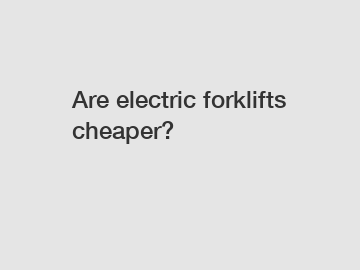Are electric forklifts cheaper?
Are electric forklifts cheaper?
Yes, electric forklifts are typically cheaper than their diesel or gasoline counterparts in the long run. While they may have a higher upfront cost, the overall savings in terms of fuel and maintenance expenses make them a more cost-effective choice for many businesses.
The cost advantage of electric forklifts stems from their lower operational and maintenance costs. Unlike diesel or gasoline forklifts, electric forklifts do not require fuel to operate. Instead, they rely on rechargeable batteries, which are significantly cheaper than constantly refueling with gasoline or diesel. Additionally, electricity costs are generally more stable and predictable than fluctuating fuel prices.

Furthermore, electric forklifts have fewer moving parts compared to internal combustion engine (ICE) forklifts, resulting in reduced maintenance and repair costs. ICE forklifts require regular oil changes, filter replacements, and other maintenance tasks associated with combustion engines. In contrast, electric forklifts have fewer maintenance requirements, resulting in lower maintenance expenses over time.
The cost savings of electric forklifts also extend to the operational side. Electric forklifts have greater energy efficiency compared to diesel or gasoline forklifts. They have high energy conversion rates and can recover energy during braking, reducing overall energy consumption. As a result, electric forklifts can operate longer on a single charge, ensuring continuous productivity without the need for frequent refueling breaks.
In addition to the economic benefits, electric forklifts also offer environmental advantages. They produce zero emissions during operation, contributing to a cleaner and healthier work environment. With increasing concerns about environmental sustainability, businesses are recognizing the importance of reducing their carbon footprint. Choosing electric forklifts aligns with these objectives and may even help businesses meet regulatory requirements related to emissions.
While electric forklifts are generally cheaper in the long run, it is essential to consider specific factors that may influence the cost-effectiveness in individual cases. Factors such as the frequency of use, the availability of charging infrastructure, and the electricity rates specific to the location can impact the overall cost calculations. Therefore, conducting a thorough cost-benefit analysis and considering the specific needs of the business is crucial when determining the cost-effectiveness of electric forklifts.
In conclusion, electric forklifts are indeed cheaper compared to diesel or gasoline forklifts in the long run. Their lower operational and maintenance costs, energy efficiency, and environmental advantages contribute to their cost-effectiveness. However, businesses should carefully evaluate their specific circumstances and conduct a comprehensive analysis to determine the optimal choice for their operations.
Want more information on 1.5 Ton Stand Type Electric Reach Truck, Agv Forklift, 2 Ton Walk Type Electric Pallet Truck? Feel free to contact us.
191
0
0

Comments
All Comments (0)